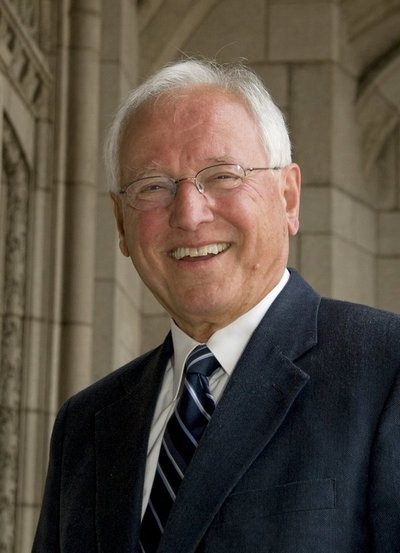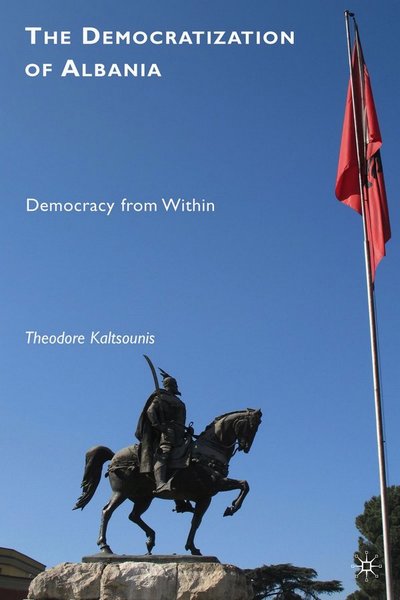July 8, 2010
How to create true democracy in Albania? From within, led by the people, UW prof writes
Ted Kaltsounis knew his professional future lay in America when a Greek education official jokingly threatened to pitch him out a seventh-story window if he didn’t take the rare opportunity to live and work in the States.
Kaltsounis was born in a part of Southern Albania that is populated by Greeks, making him an ethnic minority, he says, subject to prejudice and discrimination, especially during the communist regime. His family fled Albania for Greece in 1945, when the communists took over and his father, an outspoken Greek Orthodox priest, was in danger of being executed. Kaltsounis went on to become an elementary school teacher in Greece and didn’t see his homeland again until 1991.
Eventually he came to the U.S. under the Fulbright program and pursued a doctorate in education at the University of Illinois, Champaign-Urbana. It was when he was finishing his dissertation and visited Greece to see about employment in 1961 that the ministry official made his comic threat. Kaltsounis remembers that the man chided him, “You have such an opportunity — why are you not taking it?” He says he replied, “I will take it, but I do not want to hear from anyone the accusation that we leave and never come back.”
Indeed, even as Kaltsounis took the advice and went on to a long, productive academic career in the U.S. — including several years heading the UW College of Education’s teacher training program — the needs of Albania remained on his mind, as well as the relatives he left behind.
Now, still energetic and engaged at 80, he has finished a new book filled with his experiences and opinions on bringing reform to that country. It’s titled The Democratization of Albania: Democracy from Within, and will be published in August by Palagrave Macmillan.
Kaltsounis said he was not at first planning to write such a book, but that he received encouragement from Steve Hanson, UW vice provost for global affairs. Most previous attempts at democratizing over the decades had been “from the top down,” he said. “It would go to a point and then the government would stall it” through inaction, corruption and party-oriented politics.
His plan was different. “I was trying to develop the younger generation to lean toward more democratic ways, because the older generation was so deeply into the Marxist-Leninist views,” and talked about reform but did little to make it happen.
Knowing that education was key and that Albanian teachers tended to be among the elders stuck in older habits of thinking, Kaltsounis aimed his efforts at teachers. With funding from the U.S. State Department and under the auspices of the UW, he developed materials for training teachers in democratic citizenship education. “Three thousand teachers, representing every school district in Albania, were selected and trained as democracy builders,” he wrote in a description of his manuscript. Several Greek minority teachers were also trained, as well as representatives of several “civic-minded” nongovernmental organizations.
After this, he describes his part in the creation in 2005 of five “democratic citizenship education centers” in five different universities in Albania. “If you want to achieve anything in this country you go through the universities,” he says. He found money enough to provide the centers with basic office equipment and a library, but hopes the European Union — now with a presence in Albania to prepare the country for entry in a few years — helps finance the centers’ ongoing work.
The first eight chapters of The Democratization of Albania: Democracy from Within describe the efforts of Kaltsounis and his colleagues over 13 years of democratization education, from securing “buy-in” from the government to the nature of the curriculum materials he developed and the network of teachers he formed to push reforms along via education.
Kaltsounis said, “When I finished the first eight chapters of the book I said, OK, I am describing here a success story, but Albania is still an electoral democracy and that’s not enough — I had to come up with some kind of recommendations for how to move this forward.” Albania, he says, needs to move from electoral democracy to the “final stage” of true democracy, which is consolidation, which he described as “a level characterized by significant liberal policies and practices.”
In a later chapter, he begins to describe the model he has in mind. “It calls for the ordinary citizens to become equal partners in the democratization of their county along with the government and the professionals from outside the country.” This can be accomplished, he says, by using the “democratization network of the UW project, under the able leadership of the five university-based civic education centers.”
UW Vice Provost Stephen Hanson, who suggested Kaltsounis proceed with this project, wrote a forward for The Democratization of Albania: Democracy from Within, calling the book “a timely, important, and inspiring book.” He wrote that “in a time when so many hopes for democracy around the world have been dashed (the book) will raise the spirits of democracy activists everywhere.”
Noting that Kaltsounis’ personal story makes the story even richer, Hanson concluded, “The positive effect of Kaltsounis’ two decades of work in Albania thus clearly shows that the fate of democracy depends not only on favorable geography or socioeconomic factors — but also on the actions of committed individuals such as the author himself.”
The Democratization of Albania is a major milestone for Kaltsounis, but it’s not necessarily his final words on the issue. He says he’s more than willing to continue to help as a consultant or guide, if called upon. His own story is punctuated with a point of pride that shows his acceptance, so many years later, in his homeland — an honorary professorship he received from the University of Elbasan, in Albania, in 2004. When receiving the honor, he said, “I made it!”
His democratization theory is a bit reminiscent, to the untrained eye, of the words of Thomas Jefferson, who wrote in the Declaration of Independence, “Governments are instituted among men, deriving their just powers from the consent of the governed.”
“Absolutely,” says Kaltsounis. “But in order for the people to be effective, they must be free, educated, and committed to the democratic ways.”




